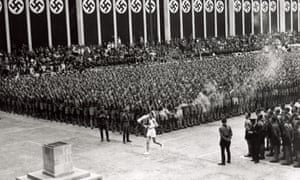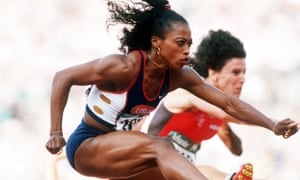The Olympics have never really been about sport. As David Goldblatt shows in this bracingly debunking history, from the outset the Games have been a way to project a view of the world, usually based on ugly politics and bogus science. When politics takes a back seat, it has been to commerce, not athletic competition. The early Games were attached to trade fairs – Paris 1900, St Louis 1904, London 1908 – which also served as giant advertisements for western culture and civilisation. At St Louis, the “Department of Anthropology” staged special contests between “civilised and native peoples” to test their respective athletic prowess. The official report concluded: “The representatives of the savage and uncivilised tribes proved themselves inferior athletes, vastly overrated.” When Hitler turned the Berlin Olympics of 1936 into a vast propaganda exercise for his racial theories, he wasn’t going against the spirit of the movement; he was simply taking it to the next level.
Pierre de Coubertin, the founder of the modern Olympics, can take much of the blame. A French Catholic aristocrat, he was a genuine internationalist, but for him that meant a celebration of the supposedly universal virtues of high European culture. Chief among these was manliness. Coubertin thought women’s sport “the most unaesthetic sight human eyes could contemplate”. Women were only allowed to compete in events that were considered suitably decorative, such as archery. If this seems a relic of the 19th century,
Goldblatt highlights how slow the Olympic movement has been to embrace change. At the 1928 Amsterdam Games, women were finally allowed to compete in the 800m, which produced a sprint finish, after which many of the athletes collapsed to the track (as they still do today). “It was a pitiful spectacle,” one correspondent wrote, “to see these girls tumble down after the finish like dead sparrows.” This was taken as proof that strenuous competition was unsuited to the frailty of the female frame. Incredibly, no more women’s races of longer than 200m were run at the Olympic Games until 1964.

Bad politics; bad science. But what Goldblatt shows is that the Games have invariably been bad propaganda too. Hitler’s efforts to project the superiority of his thousand-year Reich were fatally undermined by the success of the black American athlete Jesse Owens. Leni Riefenstahl’s films of Berlin 1936 might look impressive, but the Reich itself was gone within a decade. More recent attempts to use the Games for political purposes have hardly been more successful. In the early 1980s the Olympics got caught up in the propaganda battles of the cold war. The Americans boycotted Moscow 1980 after the Soviet invasion of Afghanistan the previous year. The Russians tried to turn their Games into an advert for Soviet communism, but all they revealed was its drab exhaustion. The Russians then boycotted Los Angeles 1984 in revenge. The Americans tried to turn their Games into an advert for the virtues of capitalism, but all they showed was its vulgarity.
The LA games did at least make money (thanks in part to sponsorship by Coca-Cola, which meant Michael Jackson couldn’t play at the closing ceremony, since he was tied to Pepsi; we got Lionel Richie instead). But here too the overall commercial record of the modern Olympics is one of failure and mismanagement. The city of Montreal was nearly bankrupted by the games of 1976 (the final debts were only paid off in 2006). Athens 2004 did its bit to wreck the Greek economy, which in turn nearly brought down the world economy a few years later.
All recent Olympics have promised to rejuvenate neglected urban landscapes and rekindle the sporting interests of local populations. They have rarely succeeded. The biggest symbol of this mismatch between expectations and outcomes is Atlanta 1996. Winning the right to host the Olympics was meant to signal the arrival of this southern outpost as one of the great cities of the 21st century. But the Games were a disaster, revealing Atlanta’s inadequate transportation system, unsuitable climate and paucity of local leadership. Plus they offered a glimpse of the domestic terrorism that has recently become a feature of American life. Boosterism and hucksterism followed by exposure and recrimination: too often that’s been the Olympics way.

It has not all been doom and gloom. London 2012 was fun while it lasted – though looking at the UK four years on, how much of that spirit of openness and excitement can you see around you today? Barcelona 1992 did a lot to turn the city into a global destination of choice (though in doing so it exacerbated the tensions between Catalonia and the rest of Spain, which continue to bedevil Spanish politics). The most successful Olympics have been the ones with the most modest ambitions, when grandiose political visions were eschewed in favour of simply trying to demonstrate that the show was still on the road. London 1948 let the world know that life was going on and it was still possible to put on major events, even if on a shoestring. Melbourne 1956 – the “Friendly Games” – reminded visitors that Australia was more than just a colonial backwater.
Rome 1960 and Tokyo 1964 did a lot to detoxify the reputations of their host countries after the disasters of the second world war. The Olympics are better for rehabilitation than for projecting global ambitions.
None of this bodes particularly well for Rio 2016. Brazil wanted to symbolise its arrival as a major player in the global order – the B in the Brics – by hosting first the World Cup and then the Olympics in quick succession. The World Cup was at best a mixed blessing (the performance of the national team did not suggest a country on the rise). The Olympics are taking place against a backdrop of political turmoil, economic fragility and, with the spread of the Zika virus, the growing possibility of a public health disaster. The Games may yet pass off successfully – and not having inflated expectations certainly helps, as Atlanta discovered to its cost – but they look increasingly like a sideshow to the serious challenges Brazil will face in the years ahead. Coubertin’s vision for the Games was always meant to be Greek not Roman: a revival of classical nobility rather than a naked projection of power. But it’s been bread and circuses all the way.
Goldblatt writes about this with all his usual intelligence and social insight. But in contrast to his magnificent history of global football – The Ball Is Round – it’s not clear that his heart is really in it. At times the book feels more dutiful than the work of an enthusiast, or even an iconoclast. Nonetheless, he retains a superb eye for the telling detail, especially in little tales of personal failure to set alongside the more familiar stories of heroic success. Some of these are haunting. At Tokyo 1964, the marathon runner Kokichi Tsuburaya only managed to come third, slowing to a walk in the final stages in front of his home crowd. Afterwards he said: “I committed an inexcusable blunder in front of the Japanese people. I have to make amends by running and hearing the Hinomaru [the Japanese anthem] in the next Olympics.” He trained for three years but when a back injury ruled him out of competing he left a note apologising for his failure and killed himself.
Goldblatt is also good on the offshoots to the main event. Earlier games staged often absurd artistic and musical competitions alongside the sporting ones. There were also occasional rival protest movements. The 1932 games in Los Angeles took place at the height of the great depression and the “Counter Olympic Committee” staged its own workers’ games in Chicago, to show up the sham inclusivity of the real thing. In 1936, in the run-up to the Berlin Olympics, an alternative “People’s Olympiad” was held in Catalonia, which attracted workers’ teams from around the world. Rio 2016 could do with one of those.
Goldblatt is gloomy about the future of the Games. The International Olympic Committee remains a secretive and unaccountable organisation, and the events it promotes are bloated festivals of corporate muscle and artificially enhanced human ones. Goldblatt fears Tokyo 2020 will simply be “a showcase for gadgetry: self-driving cars that ferry athletes to and from the Olympic village; power-assisted limbs and robotic suits making exercise and sport accessible to an increasingly elderly population; another generation of yet higher-resolution cameras and screens, faster mobile phones and the next wave of intelligent translation machines for visitors”. But why not go the whole hog and let the robots take part in the athletic competition? Human ingenuity tested by the contest of man v machine, attached to a giant trade fair. That would at least be in the spirit of Coubertin’s original vision. It would also be more fun to watch.
• To order The Games: A Global History of the Olympics for £13 (RRP £20) go to bookshop.theguardian.com or call 0330 333 6846. Free UK p&p over £15, online orders only. Phone orders min p&p of £1.99.



